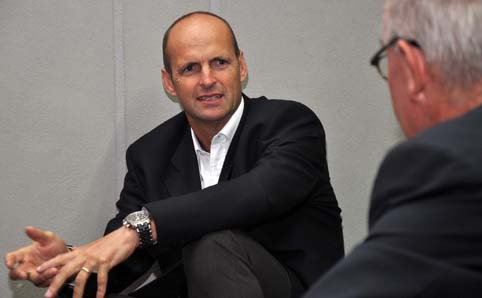Latest News Archive
Please select Category, Year, and then Month to display items
22 September 2021
|
Story Michelle Nöthling
|
Photo Supplied
 Annemarie Le Roux.
Annemarie Le Roux.
“I love working with children.” This is one of the first things Annemarie le Roux mentions when asked to describe herself. This love for children propelled Annemarie into the field of education and she graduated in 2006 with a BEd in Foundation Phase at the UFS. Annemarie immediately immersed herself in the Deaf community, enriching the lives of children at the Thiboloha School for the Deaf in Qwaqwa and the De la Bat School for the Deaf in Worcester.
The academic world enticed Annemarie back to the University of the Free State (UFS) and she was appointed as a junior lecturer in the Department of South African Sign Language (SASL) and Deaf Studies in 2013. Going from strength to strength, Annemarie completed her master’s degree in SASL in 2019, and published an
article earlier this year that she co-wrote with Marga Stander. In this article, they found that SASL “has become an increasingly popular language that hearing university students want to learn as a second language” and subsequently explored different teaching methods used for this emerging group of interested students.
Although now firmly established in academia, Annemarie is still committed to the practical application of SASL. “I am closely involved in student and community engagement through the
SIGNALS Sign Language student association that helps empower the Deaf community and South African Sign Language.” She also interprets for the Deaf community whenever she gets an opportunity, as well as for Deaf students in class and meetings.
On the importance of Sign Language and the recognition of the Deaf community in South Africa, Annemarie believes it will open greater opportunities for development. “More people will be able to learn SASL, and it might even become a subject in school for hearing children.”
Making a difference is the most important thing for Gary Kirsten
2012-05-16
 |
|
Gary Kirsten
16 May 2012
|
“Can I make a difference in someone’s life?” This was the central driving force for Gary Kirsten, head coach of the 2011 World Cup winning Indian cricket team. He currently coaches the Proteas.
Gary was the first guest speaker at a new series of lectures at our Business School. Challenges and solutions in management will be highlighted in the series. In his lecture, Gary was interviewed by Prof. Johann Coetzee, Extraordinary Professor at the Business School. The audience got a glimpse of the person often seen on television screens and they travelled with him from his childhood days at the Newlands Cricket Ground to his days in New Delhi as head coach of the Indian team.
His challenge in India was to develop a new culture in a team with very valuable and expensive brands. His light-bulb moment occurred on a team-building visit to Australia. His question to the team was what he could do for them and what they would expect from him. The turning point was Sachin Tendulkar’s answer: I would like you to be my friend. Tendulkar’s wife’s comment on the winning night was the proof of his success. She said: “The last three years were the happiest in my husband’s life.”
Gary said it was an incredible privilege to make a difference in people’s lives. “I wake up asking myself where I can make a difference in someone’s life. You must create an environment for people to enjoy the game, challenge one another and thrive.”
He is confident that the Protea team has the potential to be a great cricket team. He said the upcoming England tour is a test. “This tour will test us to be the top team in the following years. I would like to set them up for the best chance to win.”